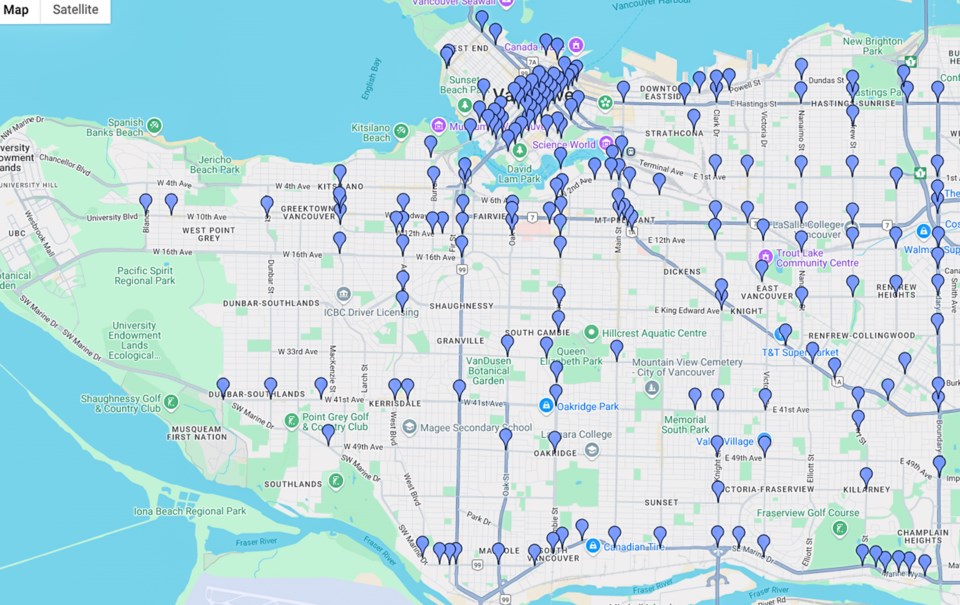A University of B.C. law professor has written a letter to the Vancouver Police Board over concerns he has with city council potentially granting the Vancouver Police Department access to 221 city traffic cameras.
, council directed staff to study the possibility of providing the VPD with real-time access to video captured by the city’s traffic camera network. Police will not potentially gain access until staff reports back to council and a vote takes place.
The council motion is what triggered Benjamin Perrin to write a letter in November to the police board in which he outlined his concerns related to privacy, civil liberties and the oversight of artificial intelligence in policing.
“This initiative represents a significant step toward mass surveillance that should alarm all Canadians, including those in our community,” he wrote in the letter, which he shared with BIV.
Every day, he said, countless Canadians walk, cycle or drive past traffic cameras, often without a second thought. Perrin said the city has assured citizens that these feeds are “not recorded or stored for after-the-fact investigative purposes,” and are used solely for real-time traffic management.
“The proposed change, however, would fundamentally alter this arrangement, effectively transforming Vancouver’s streets into venues of constant surveillance,” he said.
Retired VPD officer
Council’s move stemmed from a motion introduced by Coun. Brian Montague, a retired VPD officer, who emphasized during debate at city hall in October 2024 the public safety benefits of real-time access to the cameras.
“A live feed would assist in dealing with weapons calls, crimes in progress, missing persons, major events, natural disasters,” he said at the time. “The recorded footage would help with investigations such as homicides, assaults, robberies and motor vehicle collisions.”
Currently, all feeds from the cameras, which are located at intersections across Vancouver, can be viewed on But they are still images and delayed by approximately 15 minutes.
The Freedom of Information and Protection of Privacy Act would be the only current avenue for police to seek city camera footage, but it isn’t done because the footage is not recorded.
Montague’s motion requested that guidelines be in place for accessing the traffic cameras “to prevent misuse and to maintain public trust in law enforcement practices.” He recommended a privacy assessment of the plan.
A staff report is expected to go before council at some point in the first quarter of 2025, according to the motion.
Artificial intelligence
At UBC, where Perrin leads the university’s AI and Criminal Justice Initiative, his research and teaching interests include criminal law, constitutional law, international law and AI.
In his letter to the police board, Perrin also raised concerns about the VPD not having an AI policy, noting the department promised in 2021 to develop one on facial recognition in the wake of the Clearview AI scandal.
In 2020, the RCMP, Toronto Police Service and other police forces — including — were caught using the controversial Clearview AI facial recognition software, which scraped billions of images from social media without users’ consent.
“While other departments have responded with new policies and transparency initiatives, the VPD has not yet adopted similar measures,” said Perrin, arguing that the integration of AI technologies such as automated licence plate readers and facial recognition, is “an inevitable temptation” if access to city traffic cameras is granted.
“These technologies have proven to be far from foolproof, often misidentifying racialized individuals and introducing significant risks of error and abuse,” he said.
“The implications of this surveillance extend beyond data collection; they can deter public engagement, stifling freedoms of expression and assembly that are fundamental to our democracy.”
Perrin’s letter was mentioned briefly at the Jan. 23 police board meeting by Allan Black, the chair of the board’s service or policy complaint review committee.
Police board response
Black wrote a letter to Perrin in response to the professor’s concerns.
From a review of the material supporting Montague’s motion, Black said it was “readily apparent that council was alive to the privacy rights of its citizens, ensuring that any use of the traffic camera network by the VPD would be conducted with the utmost respect for those rights with guidelines to prevent and maintain trust in law enforcement practices.”
He said care was taken by council to ensure proper guidelines for the storage and dissemination of such information to ensure public trust. He also noted the city has committed to examine the legal and privacy implications associated with providing VPD access to the cameras.
“To date the VPD has not taken any proactive steps in advancing the city-led initiative, other than to advise the city’s staff of other Canadian police jurisdictions that have access to city-operated traffic camera systems,” Black said.
“That having been said, your email identifies a number of concerns respecting this issue which require further consideration by the VPD if and when it becomes proactive in implementing the city-led initiative, especially if those concerns have not been adequately addressed by the city’s actions identified above.”
As for the VPD not having an AI policy, Black said the department does not use AI facial recognition software as a general investigative tool.
“Similar to the issue raised above, should the position of the VPD change with respect to the use of facial recognition technology it would be appropriate to take into account and seriously consider the concerns that you have raised,” Black said. “We will bring your concerns to the attention of the VPD at the appropriate time.”
X/@Howellings


